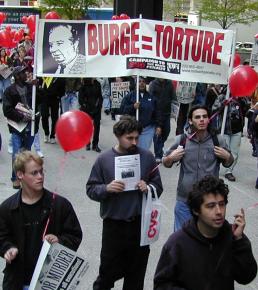Police torture victim finally free
Mark Clements is finally a free man, after spending nearly two-thirds of his life behind bars, reports .
AFTER 28 years in prison serving time for a crime he has always maintained he did not commit, Mark Clements has finally won his freedom. Mark was just 16 years old when he was taken away by the torturers of the Chicago Police Department in 1981. He has spent almost twice as many years of his life behind bars than free.
His release is the latest victory in the struggle to win justice for the victims of torture in the interrogation rooms of Chicago police stations.
With Jon Burge, the Chicago police commander who supervised the barbaric abuse, facing a trial on federal charges, prisoners, their family members and activists have stepped up pressure on Illinois officials to grant new trials for torture victims who remain behind bars. In cases like Mark's, where there was little or no evidence beyond the coerced confessions, some prosecutors have admitted they have no chance of winning a conviction in a retrial.
But to get out of prison, Mark was forced into a cruel agreement--plead guilty to the murder of Robert Watson, one of four people killed in a 1981 arson on the South Side of Chicago, in return for a sentence of time served.

"Most of the decisions have been ruled against me in lower courts," Mark said in an interview. "I would've spent the rest of my life behind prison walls, which isn't right."
AFTER HIS arrest in 1981, Mark was taken to Area 3 police station, where Detectives Higgins, McWeeny and McCann interrogated him. McCann and McWeeny went on to serve under Burge, who was later forced to resign after he and his officers were implicated in using electro-shock, suffocation, mock execution and beatings against over 100 African-American men.
In 2007, Mark wrote to the New Abolitionist, newsletter of the Campaign to End the Death Penalty, and described his ordeal:
In the police station washroom, I saw a white detective drinking alcohol. I was put in a closet-size interrogation room and handcuffed to a ring that was attached to the wall. I was beaten in the chest, arms, thighs, back and stomach. I was beaten along the boney area of my arms, shoulders and chest, and my private area was squeezed by Detective John McCann.
When Cook County State's Attorney Kevin Moore came to see me, I told him I was beaten. Moore left the room and told detectives what I told him. I was beaten again in a similar fashion, and called "ni****" during the torture of my private area.
After 10 hours of this, Mark signed a "confession," even though he was functionally illiterate at the time of his arrest. He was not allowed to see his mother or legal guardian.
At his trial, he repudiated this statement, detailed the abuse he had suffered and proclaimed his innocence. The prosecution was unable to present any non-police witness implicating him, but a jury nevertheless sentenced Mark to four life sentences on four counts of first-degree murder, plus 30 years for arson.
In 2007, Mark's new legal team uncovered evidence indicating that a motorcycle gang known as The Munsters had started the fire as revenge against a drug dealer who lived in the building.
Mark and his lawyers hoped to get this new evidence introduced in court. But rather than wait years for a new trial--and risk an arbitrary decision that could delay his freedom even longer--Mark opted to accept the plea deal. "I have a 28-year-old daughter, three grandchildren, and a mother sick with cancer," he said. "I wanted to be here to help her. If she was to pass away, I would not want to be in prison."
Virginia Clements, Mark's mother, fought tirelessly for his freedom and joined organizations like the Campaign to End the Death Penalty and the National Alliance Against Racist and Political Repression to campaign not only for her son, but for others facing similar injustices. In 2007, she developed life-threatening stomach cancer, which thankfully is now in remission. "It feels good to have my son home," she said. "He left home as a kid, and now he's a man."
Mark credits the role activists played in publicizing his case and cases of police torture victims more generally. "The most significant work was done by the Campaign to End the Death Penalty and the National Alliance Against Racist and Political Repression," he says. "Had I not had the support of these two organizations, I wouldn't be here."
The struggle isn't over, though, Mark says. "I'm going to continue fighting," he added, "to raise additional awareness about people still behind prison walls."


